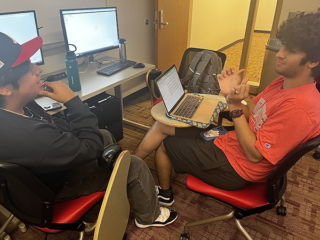Voicing Stories Through Expecting the Unexpected
There it stood; a grave unmarked. “Nancy Green” was inscribed atop the grave– but nothing more. Any unheeding person may have simply carried on– not thinking anything of it. Albeit, it wasn’t just any ordinary person who noticed the grave. Erick Johnson, editor at Capital B, had just found a story.
Nancy Green, better known as “Aunt Jemima” was a slave who had turned into an American advertisement icon as the face of pancake syrup in 1893. For almost 100 years, no one could locate her grave. That was until Sherry Williams, president and founder of the Bronzeville Historical Society, unraveled this decades-long mystery around 2005.
“I look at Nancy Green as a Black mother figure, and Black women are the lifelines for generations, both Black and white,” said Williams.
Williams found Green’s grave in Oak Woods Cemetery, Chicago, Illinois. Five years after Williams discovered the grave, Johnson unexpectedly had a change of plans as he ventured into the Oak Woods Cemetery after his computer broke down. He stumbled across Green’s grave and had no clue as to who this person was.
“When you’re investigating, it’s like a puzzle,” Johnson said. “All the pieces start coming together.”
The sole fact that it was unmarked got the gears in Johnson’s journalistic mind turning. Subsequently, this led him straight to the cemetery office where he started the questioning process. Johnson knew that the public had to be informed of this major discovery, so he wrote and published a piece for the Chicago Crusader of the tale behind Nancy Green’s grave.
“There is a phrase, even to this day, that just gets me all riled up,” said Johnson. “Expect the unexpected.”
Johnson did not walk into the Oak Woods Cemetery knowing he would find Aunt Jemima’s grave. He did not know that he would have a story. Only through the spontaneity of the occurrence and his mindset was Johnson able to write a story, publish it, get recognized for it and win several awards. He inquired about the unmarked grave he observed right away because he knew that everything and everyone has a story. So many people have something to say, including students. A rising junior, Frank Messina, reflected on the importance of sharing students’ stories.
“It’s crucial to share these stories to learn from them and help as much as we can.” Said Messina.
Johnson stressed that only through asking questions and hyper-local journalism can the most impactful stories be found. Whether it’s a family-member, friend, or a random person on the street, there will almost always be something deserving of being recognized and given a platform to.
“I’m taking a story about someone with purpose, especially if that person does not have a voice,” said Johnson. “This story has to be told.”

